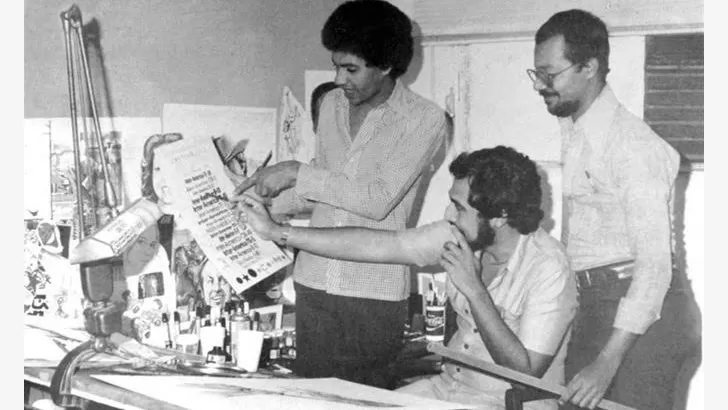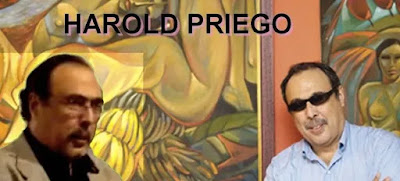Otra vez el espejo ha vuelto a moverse, lo he sentido a mis espaldas, he sentido su aliento, el aliento fétido de su alma podrida, su respiración rota, su respiración ronca y pausada, el olor que invade la habitación, casi toda la casa, sus mínimos intersticios. Y percibí el ademán que parecía amenazante.
Seguidores
21/8/21
10/7/21
12/6/21
Agua difunta
Galería de los espejos del palacio de Versalles.
30/5/21
Imaginario del 30 de nunca
Pedro Conde Sturla
La bestia había salido, como de costumbre, a pasear por el Malecón en compañía de sus fieles. Esa noche lo acompañaban, de acuerdo a informes dignos de crédito, Miguel Ángel Báez Díaz, Arturo Espaillat, Rafael Paíno Pichardo, Jhonny Abbes García, Luis Rafael Trujilllo (Nene), Augusto Peignand Cestero, el general José René Román Fernández (Pupo), jefe de las Fuerzas Armadas, y su edecán militar, el coronel Marcos Jorge Moreno. Al grupo se uniría después Virgilio Álvarez Pina (alias Cucho). Un selecto grupo de sus mejores hombres, entre los que no faltaban matarifes, torturadores, aduladores, sicofantes…22/5/21
This Afternoon I Saw the Rain
Translation, Short storyComment
This year marks the 60 anniversary of the assassination of Dominican dictator Rafael Leónidas Trujillo. It also marks the end of his brutal thirty-year regime (1930-1961). In commemoration of this important event, Esendom is publishing an English translation of a short story by Pedro Conde Sturla which he dedicated to the poet Ramón Tejera Rosas. The original in Spanish appears in the short story collection Los ritos ancestrales (2018). This short story also appeared in the online literary portal Letralia. This short story was translated with permission from the author.
The backdrop of “This Afternoon I Saw the Rain” (Esta tarde vi llover) is the Trujillio dictatorship itself. The short story takes its title from a popular bolero by Mexican lyricist Armando Manzanero. Like a bolero song, this allegorical snapshot of youth and everyday life under an oppressive regime fills the room with a slow-tempo melody. The music here is personal, open to interpretation. The story could easily be construed either as a meditation on teenage love, friendship and youthful mischief; or simply put, as a tender love letter full of heartbreak, nostalgia and good memories.
All throughout, rainfall plays a central role, a trope that pieces together the chronology of events as the past becomes a footnote of hurt and joy and at times, a meditation of the changing of the seasons.
Read the short story in Spanish
Mochoxita/Esendom
This Afternoon I Saw the Rain by Pedro Conde Sturla
Translated by Amaury Rodriguez
I hardly remember having loved you. I hardly remember having loved you at all now that you carefully slip away from me now. That curling braided, yellow hair and the distant, whimsical smile. The black pupil in your eyes. That spark that lights the fire of nostalgia. The bonfire that sculpts and draws— and in the words of the poet— the smoke of your face.
Those were unfortunate rainy days. At that time of teenage rain, the dim light evenings bloomed in your braids like a sweet twisted rose. In those days, it hardly rained but I remember that I loved you, and I remember that, just like me, you loved rainy days; those delinquent and cordial days that in the smooth contour of things acquire a double presence in the water, and the air of the city feels dense, full of poetry.
In those days, there was an element of magic in the rainy city, a mysterious aura. The melancholic rain falling softly on the gentle April sunsets and the end of May. There was a contrast between the mournful mist, and the charm of the Venezuelan Oak trees in Bolivar Avenue, their colors brilliantly exploding in unison.
After May, there was, above all, in that bucolic and deceptively peaceful setting, a violent contrast with an almost sinister touch. The reserved air of certain luxury houses with shut windows, closed doors and large houses locked as though they were empty. There was a dense harrowing impression: The Terror. A metaphor: A metaphor of terror that pervaded the most intimate spaces. The sharp edge of a cold terror that cut like ice. Terror meant curfew, martial law and persecution. Terror. The soldiers of the dying regime knocking down doors and windows; arresting opponents, inflicting torture and carrying out summary executions. And after May, Terror laying on its deathbed.
And then it seemed like the world had suddenly gone mad, suddenly rejecting us with a brutality that we had not anticipated. There it was. The shrapnel and the gloomy night movement of state security forces…the barking of dogs.
From that time, I still preserve in my mind a tragic image of our farewell at the airport. In this image, your mother’s mourning arm is wrapping you. The mourning of your mother is wrapping you; your mother’s weep. Your big, red eyes. Glacial and empty eyes. Just a simple goodbye between teenagers. One of those episodes that, in all truth, mean nothing and yet, the mind records it for the future. And one day this image returns again and again when one is awake. And the image stays in one’s mind like a repeating loop during sleep.
Many years later, I went back to see you during a short trip when we almost were not friends. When we had almost forgotten one another. Our encounter turned out to be the opposite of a reunion. Sometimes, geographic distance and losing touch with one another— and even life itself— can lead to terrible things like this. Oftentimes, the abyss of time turns friends and lovers into strangers. By then, the echo of our platonic romance and our conversations in the living room of your house in Cervantes Street was an old memory. History. Our relationship was always confined to that abandoned space that is now for sale. The smoke in your face was as absent. We had nothing to say to one another except for trivial things.
You were no longer the girl with braids and you will never be again. I saw bitterness in your smile. Gone was the brightness of another era; the spark that ignited your words: I hear a disenchanted voice, a sad voice. Apart from some details, for someone who had not met you in your vast splendor, you looked the same. Not the same as before. More like autumn. Slightly faded. Fate was unkind to you and it turned your carmine-like face into a mask of loneliness, anointed with solitude. Perhaps these are the traces of an incurable love.
Now I'm back to see you again and you're not. Just thirty years have passed and you are not and will never be forever. Now that I see you so lost in the spaces of a sordid death, I think of those April days, I think of the rain; the memorable rain of our youth. I think of those meek April sunsets and all the times we swear that at sunset, just like the fall of life, we would see the rain falling from the windows of your house.
—
Pedro Conde Sturla (b.1945, Dominican Republic).—Pedro Conde Sturla is a literary critic and short story writer. He is an emeritus professor of the Universidad Autónoma de Santo Domingo (Autonomous University of Santo Domingo) and a former member of the Partido Socialista Popular (Socialist People’s Party), forerunner to the Dominican Communist Party. A sharp social critic, Sturla combines elements of satire, comedy and tragedy and at times, the absurd in his work. Sturla explores themes of social conflict and conservative, ideological reproduction. He is the author of Antología informal (1970), Notas sobre el «Enriquillo» (1978), «El chivo» de Vargas Llosa: una lectura política (2000), Los Cocodrilos (1984) Los Cuentos negros (2004) and Uno de estos días de abril (2014), a short historical novel on the 1965 revolution in the Dominican Republic. His latest book is the short story collection Los ritos ancestrales (2018).
3/5/21
La agencia (1-7) Serie completa
A manera de introducción
apoyo y homenaje al caudillo de ese partido, que bautizó con
el honroso nombre de “Lo que diga Balaguer”. La creación hacía honor al creador y al creado.
prohombre se hubiera sentido orgulloso al ver su imagen en cuatro patas en un afiche a todo color. Total, era esa la forma en que se ganaba la vida.
La agencia
Tres genios de la publicidad y no pueden con una campañita. ¡Qué desperdicio de dinero!
 |
| Harold Priego en compañía de dibujantes publicitarios |
El catalán dijo que eran las once y media y no habíamos vendido ni una escoba. Eso quería decir —por lo menos en catalán—, que el negocio andaba mal. Y en términos publicitarios significaba que no habíamos parido ni una idea. La agencia publicitaria para la que trabajábamos se había comprometido a presentar para ese mismo día una campaña a uno de sus principales clientes y no habíamos vendido ni una escoba.
1/5/21
La agencia (7 de 7)
 |
| Harold Priego |
La agencia (7 de 7)
Ya yo tengo trabajo, lo que yo quiero es robar sin tener que trabajar, como hacen los políticos.
24/4/21
La agencia (6)
La agencia (6)
Mi marido está preso por un asunto de drogas y nos cerraron el prostíbulo...
Algún tiempo más tarde, una despampanante delegación encabezada por la hermosa Jocelynda y otras ejecutivas hizo acto de presencia en el departamento de creatividad para darnos las condolencias. La verdad es que todos estábamos sinceramente condolidos y nos condolenciábamos
16/4/21
La agencia (5)
La agencia (5)
Los médicos —según se dice y se sabe— mandan sus errores al cementerio, los abogados los mandan a la cárcel y los publicistas a los diarios.
10/4/21
La agencia (4)
La agencia (4 )
Harold le preguntó a boca de jarro (o mejor dicho a boca de Harold) que por qué siempre compraba pantalones sin fundillos.
El licenciado presidente se marchó o fingió marcharse a eso de las nueve de la noche y nos dejó a cargo de la campaña de Sanadol, y a la media hora ya estaba de regreso. Había subido clandestinamente por el ascensor, abrió teatralmente de par en par las puertas del departamento de arte y se apareció con ropa de paisano, un suéter y un jeans que no le quedaban del todo bien, pero nadie le prestó mayor atención. Sin corbata ni saco, aunque con su misma cara de gendarme, su autoridad parecía disminuida y se veía más esmirriado y pequeño, casi indefenso, inofensivo, sólo aparentemente inofensivo.
 |




